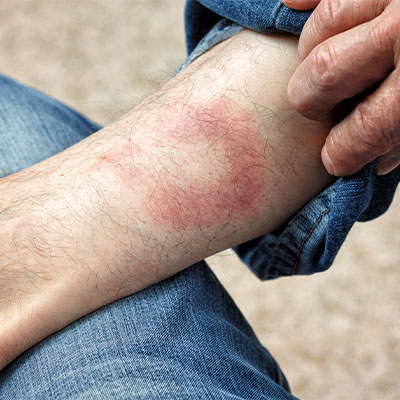Tick Bites
Tick Bites
Many tick bites are painless and cause only minor signs and symptoms such as swelling, redness, or a sore on the skin. But some ticks transmit bacteria that cause illnesses, including Lyme disease and Rocky Mountain spotted fever. In general, a tick needs to be attached for at least 36 hours to pass a bacteria to a human, but there are some infections that can be transmitted in a few hours or even a few minutes.

What To Do if You Have a Tick Bite:
- Remove the tick promptly and carefully by using fine-tipped forceps or tweezers to grasp the tick as close to your skin as possible. Carefully and gently pull the tick out with a slow and steady upward motion. Avoid squeezing or twisting the tick. Do NOT handle the tick with bare hands. Use a hot match or fingernail polish to remove the tick.
- Seal the tick in a container and put the container in a freezer so you can show it to your provider if need be.
- Wash your hands and the bite site using warm water and soap, rubbing alcohol, or an iodine scrub.
Seek emergency care if you develop any of the following symptoms:
- A severe headache
- Difficulty breathing
- Paralysis
- Heart palpitations
Contact a health care provider if:
- You are not able to completely remove the tick. The longer the tick remains attached to your skin, the greater your risk of getting a disease.
- The rash gets bigger. It is normal for a small red bump to appear at the site of the tick bite. But if this develops into a larger rash or has a bull’s-eye pattern, it may indicate Lyme disease. This rash usually appears within three to 14 days.
- Develop flu-like signs and symptoms. If you develop a fever, chills, fatigue, muscle and joint pain, or a headache, see your provider.
- You think the bite site is infected. If you see redness or oozing, see your provider.
- You are quite confident you were bitten by a deer tick. Your provider may want to start treating you immediately with antibiotics.
If possible, bring the tick with you to your provider’s appointment. Our primary care providers at Catawba Valley Healthcare are here to evaluate and treat your tick or other insect bites.
Call us today at (828) 695-5900
